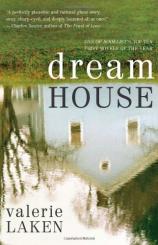Reading Group Guide
Discussion Questions
Dream House

1. What does the phrase "Dream House" mean to you? Is this a good title for Valerie Laken's novel? What makes a "home"? Is a Dream House different from a home?
2. Speaking of home, consider what that word means for the main characters --- for Kate and Stuart Kinzler, for Walker Price, for Jay Harrison.
3. Kate and Stuart live in an apartment at the beginning of the story. Can an apartment be a home? What are your thoughts about apartments versus houses? Why, as Americans, are we driven by the notion of home ownership?
4. What role do dreams and nightmares play in the novel? How do Walker's dreams shape his reality? How do Kate's nightmares shape hers?
5. Why is Walker fixated on the house? Why is Kate? How are their desires and obsessions similar? How do they clash?
6. What do you think of Walker? Do you feel differently about him after learning the details of the tragic event at the center of the story?
7. Walker was barely out of high school when he was sent to prison for eighteen years. The world he left was much different from the world to which he returned. Imagine if you were gone for such a long period --- and had left at such a young age. How might the world look to you? How do you think you would cope if you were Walker?
8. At the beginning of the novel why did Jay let his girlfriend Claire into the house? How did that choice alter both of their lives? How does it emotionally connect Jay to Walker and Kate?
9. After his physical confrontation with Claire, Jay thought, "So this is how these things happened." What enlightenment did he elicit from that sad event with Claire?
10. Discuss the relationships Kate, Stuart, and Walker have with their families. How did their family life shape them and affect their behavior? How do they each see themselves in relation to their families—and in relation to each other? Can people move beyond their early influences and experiences?
11. Kate, Stuart, Jay, and Walker view themselves as weak and rather powerless, though others do not. What do you think of them? How do their actions belie their perceptions? Offer some examples.
12. Kate is described as having "a weak spot for improvement projects… She believed in the power and responsibility of humans to fix what was wrong with the world." How does this color her relationship with her husband? Her attitude towards the house? Her desire to get a dog? Her friendship with Walker and Jay?
13. Talk about Kate and Stuart's marriage. Why did these seeming opposites come together? How did their differences affect their marriage? What kind of future do you envision for them?
14. When she first finds the house, Stuart is reluctant to move. She tells him, "I need this. I'm sorry. I really need this." Why? Have you ever felt such a need, be it for a house or something else? And why does Stuart go along despite his hesitations? What might have happened if he'd said no?
15. How are relationships like houses? How does Kate's renovation of the house reflect the state of her marriage?
16. Stuart claimed he loved Kate. "And no matter what she was feeling for him these days, he loved her. People didn't always have to love you back. Sometimes they didn't have it in them." Do you agree with this? Can a relationship --- especially a marriage --- that is imbalanced survive?
17. Was Stuart right in leaving Kate the way he did? Ruminating on his break, he concludes, "Sometimes your only choice in life was to step out of your life altogether." What do you think? Would things have been different if he'd stayed?
18. Why does Kate tell Stuart that his leaving was the "bravest thing he's ever done"?
19. Talking to Kate, Walker says, "You can tell a lot about somebody by their home." Kate agrees. In the novel they play a game, trying to imagine what their neighbors are like based on the look of their houses. How does this game play out when Kate sees the inside of Jay's house? Were you surprised at what she discovered inside? What do you think your residence might say about you?
20. "In the end no place was safe. Every place had a history." How does this theme recur throughout the novel? Can "good" history --- much as what we think of as "bad" history --- have a negative effect? How is this demonstrated?
21. In some cultures, fire is considered a form of purification. Did the house's burning "cleanse" Kate and Walker?
22. During her renovations, Kate finds a letter lost in the walls of the house. At the novel's end, she speculates about its author. "She was trying to sound brave and strong, optimistic, trying to tell the people who knew her back home that she'd be all settled soon, and ready for visitors, and they'd all be amazed to see what she had built here." Does this reflect Kate's new vision of herself? Has she changed? Do you think she will find contentment?
23. Class, race, love, and loss are major themes interwoven throughout the novel. How do each play out through the characters' actions and outlooks? If Walker had been white, if Kate had not come from an overachieving upper middle class family, how might the story be different?
24. Charles Baxter, the author of The Feast of Love, hails the novel as "a perfectly plausible and rational ghost story: sexy, sharp-eyed, and deeply haunted." Do you think this is a ghost story? Who is being haunted? Are their ghosts finally put to rest?
Dream House
- Publication Date: February 6, 2013
- Paperback: 352 pages
- Publisher: Harper Perennial
- ISBN-10: 0060840935
- ISBN-13: 9780060840938







